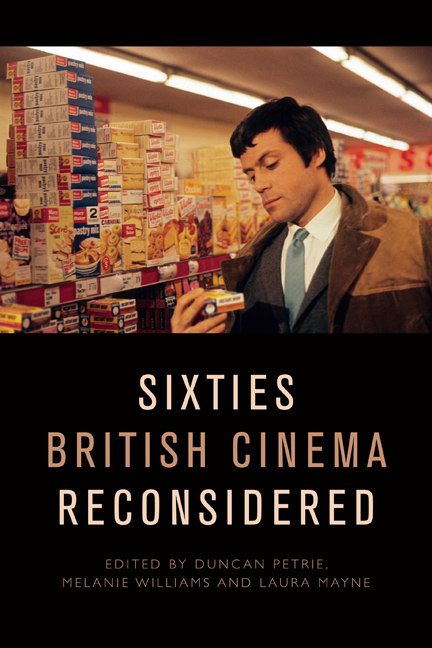Book contents
- Frontmatter
- Contents
- List of Figures and Tables
- Notes on the Contributors
- Introduction
- PART ONE STARS AND STARDOM
- 1 Male Stardom in 1960s British Cinema
- 2 ‘Rebel Rebel’?: Oliver Reed in the 1960s
- 3 Carol White: The Bardot of Battersea
- 4 ‘The Old Wave at Work’: The Transatlantic Stardom of the British Character Actress in the 1960s
- PART TWO CREATIVE COLLABORATIONS
- 5 Woodery-pokery: Charles Wood’s Sixties Screenwriting
- 6 ‘Beyond Naturalism’: Jocelyn Herbert, If . . . (1968) and Design for Performance in 1960s British Cinema
- 7 Kes: From Page to Screen
- 8 ‘I’d like to remember you as you are – as just a grumpy old man’: Joseph Losey and the Making of Figures in a Landscape (1970)
- PART THREE STYLE AND GENRE
- 9 ‘Wholesome rough stuff’: Hammer Films and the ‘A’ and ‘U’ Certificate, 1959–65
- 10 Widescreen Pyrotechnics: Shot Composition and Staging in the Cold War Films of Joseph Losey and Sidney J. Furie
- 11 The Rise and Fall of the Colourful Corporate Fantasy in 1960s British Cinema
- 12 Witchfinders and Sorcerers: Sorcery and Counterculture in the Work of Michael Reeves
- PART FOUR CULTURAL TRANSFORMATIONS
- 13 ‘An Impulse of Anger, Instantly Regretted’: Rebellion and Reaction in the Early-1960s Naval Film
- 14 Narratives of Race and Identity in Sixties British Cinema
- 15 Panic at the Disco: Brainwashing, Alienation and the Discotheque in Swinging London Films
- Index
11 - The Rise and Fall of the Colourful Corporate Fantasy in 1960s British Cinema
Published online by Cambridge University Press: 22 September 2020
- Frontmatter
- Contents
- List of Figures and Tables
- Notes on the Contributors
- Introduction
- PART ONE STARS AND STARDOM
- 1 Male Stardom in 1960s British Cinema
- 2 ‘Rebel Rebel’?: Oliver Reed in the 1960s
- 3 Carol White: The Bardot of Battersea
- 4 ‘The Old Wave at Work’: The Transatlantic Stardom of the British Character Actress in the 1960s
- PART TWO CREATIVE COLLABORATIONS
- 5 Woodery-pokery: Charles Wood’s Sixties Screenwriting
- 6 ‘Beyond Naturalism’: Jocelyn Herbert, If . . . (1968) and Design for Performance in 1960s British Cinema
- 7 Kes: From Page to Screen
- 8 ‘I’d like to remember you as you are – as just a grumpy old man’: Joseph Losey and the Making of Figures in a Landscape (1970)
- PART THREE STYLE AND GENRE
- 9 ‘Wholesome rough stuff’: Hammer Films and the ‘A’ and ‘U’ Certificate, 1959–65
- 10 Widescreen Pyrotechnics: Shot Composition and Staging in the Cold War Films of Joseph Losey and Sidney J. Furie
- 11 The Rise and Fall of the Colourful Corporate Fantasy in 1960s British Cinema
- 12 Witchfinders and Sorcerers: Sorcery and Counterculture in the Work of Michael Reeves
- PART FOUR CULTURAL TRANSFORMATIONS
- 13 ‘An Impulse of Anger, Instantly Regretted’: Rebellion and Reaction in the Early-1960s Naval Film
- 14 Narratives of Race and Identity in Sixties British Cinema
- 15 Panic at the Disco: Brainwashing, Alienation and the Discotheque in Swinging London Films
- Index
Summary
In an opening internal monologue, performed direct to camera and set against a striking, deep blue twilight, protagonist Jimmy Brewster (Alan Bates) announces: ‘let's face it, it's a filthy, stinking world. But there are some smashing things in it – and I want them.’ The title sequence that follows features a series of opulent images from champagne glasses to fancy sports cars; all bleached in vibrant tones. The ‘smashing things’ Brewster refers to are not merely the most expensive or glamourous but also, crucially, the most colourful.
The film in which this scenes features, Nothing but the Best (1964), was released at the moment when colour was beginning to enliven the British cultural scene during the early 1960s and would go on to eventually dominate in cinema by the end of the decade. In this prologue, the pursuit of wealth and status is seen as desirable, presenting the prospect of a more exciting and colourful existence. Moreover, in an era characterised by increased social mobility, British cinema of the 1960s showcased a succession of films featuring male protagonists determined to succeed in the world of big business and entrepreneurialism. This chapter focuses on the figure of the aspirational climber, tracking his progression and development in films throughout this period. It explores how the aesthetic features of such films engaged with the masculine narratives they played out on screen. Specifically, it considers how the full-scale conversion to colour during this time impacted on the corporate fantasises presented in such films, focusing on two movies that epitomised these tropes and trends. Nothing but the Best, written by Frederic Raphael and directed by Clive Donner, provides an early sixties example of a young man on the make, determined to succeed at any cost, and is presented in the mode of black comedy. It will be compared with The Man Who Haunted Himself (1970), directed by Basil Dearden and written by Dearden and Michael Relph (with uncredited help from Bryan Forbes); a film that includes similar themes of corporate ascendency but with much darker overtones of self-destruction.
This shift highlights changes in the filmic identity of the aspirational climber throughout the decade, as each film portrays the differing psychological effects on its male protagonists.
- Type
- Chapter
- Information
- Sixties British Cinema Reconsidered , pp. 179 - 192Publisher: Edinburgh University PressPrint publication year: 2020



